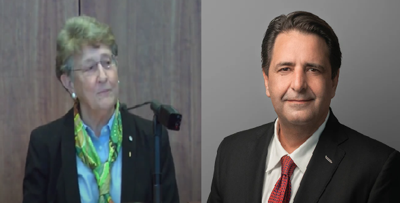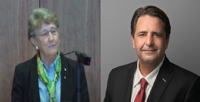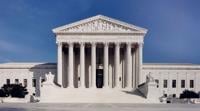
Jean Toal, left, and Peter Protopapas
COLUMBIA, S.C. - A former chief justice of the South Carolina Supreme Court will defend unusual procedures she has established as head of the state’s asbestos docket at a hearing today, as foreign companies argue they have no business being dragged into her court.
Judge Jean H. Toal has repeatedly appointed a Columbia personal-injury lawyer as receiver over defunct companies with a mandate to collect money from decades-old insurance policies to distribute to asbestos plaintiffs. The judge has encountered stiff resistance as she has expanded that strategy to include solvent companies based in other countries, however, which have living owners who are willing to fight back.
Those companies, including mining giants DeBeers and Anglo American, will argue at today’s hearing that Judge Toal made a mistake by trying to put her favored receiver, Peter Protopapas, in control of U.K. firm Cape Intermediate Holdings.
Protopapas has used his appointment to sue Cape’s parent company, Altrad Group, as well as De Beers and Anglo American under a theory they all colluded to hide assets from South Carolina asbestos plaintiffs. Cape mined asbestos in South Africa until the early 1980s; Altrad bought Cape in 2017, decades after it stopped selling asbestos.
The defendants argue Judge Toal appointed Protopapas receiver over Cape in the name of a plaintiff named Park who no longer had an active case against the company. Keith Park was the representative of his mother’s estate, who had sued Cape, but he closed her estate and all her legal affairs months before Judge Toal appointed Protopapas receiver, supposedly at Park’s request.
More recently, the judge has allowed Protopapas to act in the name of a plaintiff named Tibbs who never requested a receiver be appointed, as required under state law.
Altrad, in a motion filed last week, said Protopapas was appointed when there were no active parties to make the request and thus “all `Cape’ proceedings have been a nullity from the beginning.” DeBeers and Anglo American made similar filings, all requesting Judge Toal end the purported receivership. A U.K. court with jurisdiction over Cape has also declared the receivership illegal and ordered Protopapas to pay more than $1 million for interfering in Cape’s operations.
Judge Toal is unlikely to back down at the hearing. She seemed puzzled at times at a previous hearing about the implications of state Supreme Court rulings that limit receivers to acting in a single case and only with a valid appointment order from the judge. Protopapas argues that is not how the South Carolina Supreme Court ruled, but if he is wrong, everything he has done in the Cape case so far is, as the defendants say, “a nullity.”
Judge Toal has appointed Protopapas as receiver for more than 20 firms so far, under agreements that let him keep 30% of any money he collects. Protopapas has taken in more than $50 million so far, earning millions of dollars in fees for himself and placing the rest of the money in secretive Delaware trusts he says are used to pay plaintiff-lawyer fees and settlements to other asbestos plaintiffs.
The Supreme Court’s order that a receiver can only be appointed to pursue assets to satisfy one case “is at odds with the very first receivership I established about which no one has fussed or complained one bit,” the judge said at a hearing last month. “It was the ground under which this whole asbestos docket changed.”
Protopapas will argue he can proceed as receiver over Cape because the company is guilty of “moral fraud,” both by engaging in a conspiracy from the 1950s to the early 1980s to evade liability in the U.S., and by aggressively fighting him in U.K. courts.








